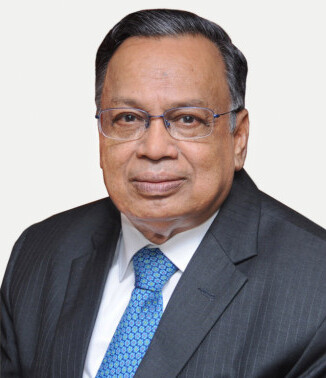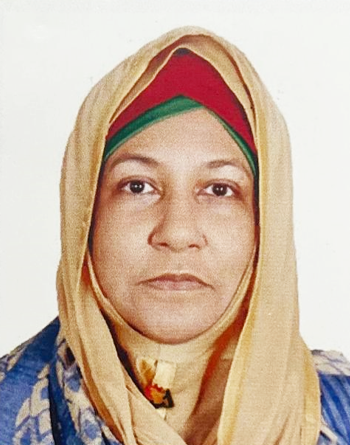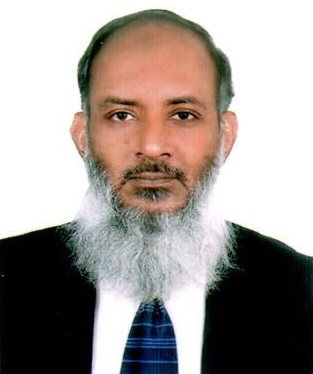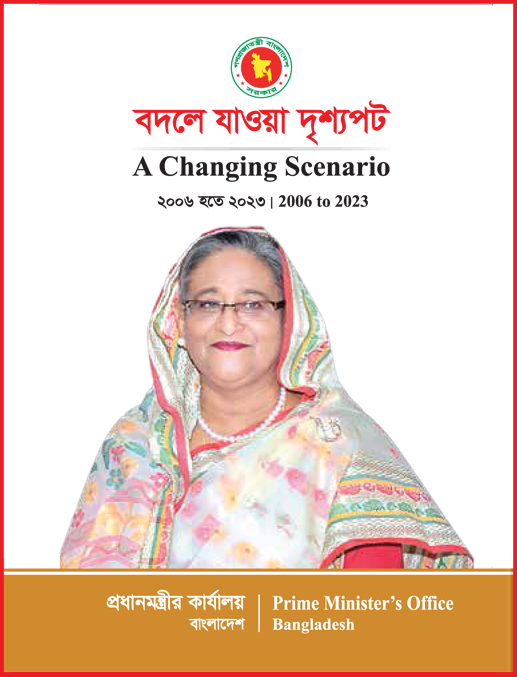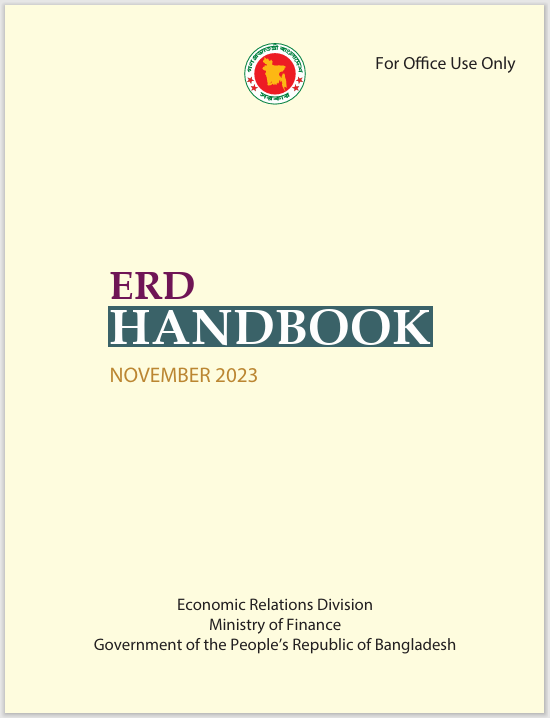Wing-4: UN
UN Wing mainly coordinates with three UN ExCom agencies (UNDP, UNICEF and UNFP A) and technical agencies of the United Nations namely F AO, ILO, UNIDO, UNIFEM, UNEP and UNCDF etc for their technical assistance in Bangladesh. It also keeps liaison with the Permanent Missions of Bangladesh to the United Nations at New York and Geneva, Economic Wing of Bangladesh Missions in abroad, UN Resident Coordinator's Office at Dhaka for the matters relating to the Executives Boards, Headquarters and country level offices of these organizations. Moreover, it also looks after the activities carrying out by Trust Funds attached to the UN Organizations, for example Global Environment Facility(GEF), Global Fund to Fight against AIDS, Tuberculosis and Malaria (GF A TM) etc. All UNorganizations provide technical assistance in the form of grant only.
UN Organizations in Bangladesh have been providing support to the Government of Bangladesh in the following areas:
UNDP (i) Democratic governance and human rights (ii) Sustainable environment management (iii) Economic growth and poverty alleviation (iv) Reduction of social and economic vulnerability (v) Gender equality and the advancement of women
UNICEF:(i) Health and nutrition (ii) Water and environmental sanitation (iii) Education (iv) Child protection (v) Policy, advocacy and partnership
UNFPA:(i) Reproductive health (ii) Gender (iii) Population and development
FAO:(i) Agriculture (ii) Food security
ILO: Child labour
UNESCO: (i) Education (ii) Conservation of culture and heritage
GFATM: (i) HIV / AIDS (ii) Tuberculosis (iii) Malaria.
Branch: UN-I
UN-I Branch deals with two UN ExCom agencies namely UNDP and UNFPA. In addition, Coordination with Resident Coordinator’s office is also the responsibility of this branch. It consists of three sections 1) UN-1 responsible for activities related to General policy issues relating to the UN system and UNDP (activities under poverty and governance thematic area), 2) UN-2 responsible for UNFPA and 3) UN-3 responsible for UNDP, GEF and UNIFEM.
A brief description of section-wise activities is given below:
Section: UN–1
General policy issues relating to the UN system, particularly UNDP, UNITAR, Inter UN agency policy issues and coordination, Pledge/contribution to UN Bodies, matters relating to UNDP-UNFPA Executive Board, management of UNDP including monitoring delivery position, monitoring implementation status of UNDP-supported programmes and projects, annual & mid term review of UNDP supported programmes and projects, processing of the cases for short training courses, seminars and conferences sponsored by the UNDP.
Section: UN–2
Policy, programming, projects and other issues relating to UNFPA, UNCDF, UNAIDS, Inter-
country/regional programme and projects executed by above agencies.
Section: UN–3
Management of UN technical assistance programmes co-financed with other development partners, policy, programming, projects and issues relating to Global Environment Facility (GEF), Montreal Protocol, Persistent Organic Pollutant Convention (POP), United Nations Development fund for Women (UNIFEM), national execution of UNDP-supported programmes and projects, Processing UNDP-supported programmes and projects in environment, crisis prevention and women’s advancement sectors, including cost-sharing with other development partners.
UNDP Assistance in Bangladesh
UNDP’s activities in Bangladesh are guided by the Standard Basic Assistance Agreement (SBAA) signed on 25 November 1986. UNDP provides funding for technical assistance to develop and enhance the national capacities. Under the Country Cooperation Framework (CCF), 2001-2005, UNDP and its partners achieved key results in the areas of decentralized governance for poverty reduction, sustainable environment, economic empowerment of vulnerable groups, gender mainstreaming at the local and national level disaster risk reduction, and HIV/AIDs awareness and prevention. UNDP and Government of Bangladesh already signed a US$ 266 million Country Programme Action Plan (CPAP). Regular resource allocation (TRAC) for the CPAP 2006-10 is US$ 53.63 million.UNDP will mobilize an additional US$ 212.42 million from the Global Environment Facility, bilateral and multi-lateral funding institutions, global trust funds and the private sector subject to interest by funding partners. Under the CPAP different UNDP assisted projects and programmes will be implemented from 2006 to 2010. The UNDP CPAP 2006-10 will contribute in five major programme areas:
Democratic governance and human rights
Sustainable environment and energy management
Economic growth and poverty alleviation
Reduction of social and economic vulnerability
Gender equality and advancement of women
Goals, key results and strategies of the current Country Programme:
The CPAP will contribute to development results in areas where national priorities and United Nations
Development Framework (UNDAF) outcomes coincide with the UNDP mandate and comparative
advantage. The UNDP CPAP 2006-10 aims to achieve the following outputs:
Enhancing democratic practices through strengthening the working of the Parliament, its infrastructure,
capacity and knowledge management.
Improving the working of the Election Commission and strengthening the electoral process towards free
and fair election.
Establishment of institutional framework for protection of human rights and dissemination of HR status
particularly of the disadvantaged; Reforming Bangladesh Police and developing capacity for
improvement of law and order.
Improved access to public information by bringing in legal changes through participatory process and
technology applications.
Strengthened capacity of civil services by way of designing and implementing a comprehensive plan for
improved organizational performance, including ICT applications; merit-based recruitment; citizen-
oriented training and aid governance.
Institution built in CHT for improved and inclusive development with community participation and self
reliance in an environment of enhanced security.
National capacity enhanced through institutionalization and mainstreaming of sustainable environmental
management and governance and implemented in select areas; agricultural biodiversity and
environmental agreements compliance promoted.
Phase out of Ozone Depleting Substances and reducing pollution in select industries, preparation and
implementation of PoPs.
Capacity enhanced for MDG/PRS monitoring and results published.
Basic service delivery capacities and participatory governance practices of local government enhanced
to the benefit of the poor.
Improved capacity for effective local economic development planning at urban communities and elected
local governments for urban poverty reduction and employment-generating export-led economic
growth.
National policies and plans aligned with changed focus on risk reduction and institutional capacities
strengthened at national, local and community levels including emergency preparedness.
Adaptation measures to the impact of climate change, especially in agricultural sector strengthened.
Identification of mechanism for regional cooperation for coordinated response to disasters.
Public awareness of HIV/AIDS raised and HIV/AIDS related data management established.
Increased women’s voice and presence in the politics and administration at national local levels;
increased generation, availability, and use of gender-disaggregated data; Increased support for women’s
empowerment and transformation in societal attitudes to women and gender.
Harmonized mainstreaming and Access to Gender Justice.
Gender concerns and issues, including HIV/AIDS and environment, addressed though macro planning.
Resource Plan for the Country Programme Action Plan (2006-10):
(In US$ )
|
Programme Areas |
Regular Resources (core Resources) |
Other Resources (non-core resources) |
Total |
|
Democratic governance and human rights |
20,000,000 |
67,435,000 |
87,435,000 |
|
Sustainable environment and energy management |
9,136,000 |
51,071,000 |
60,207,000 |
|
Economic growth and poverty alleviation |
13,300,000 |
74,000,000 |
87,300,000 |
|
Reduction of social and economic vulnerability |
7,700,000 |
14,914,000 |
22,614,000 |
|
Gender equality and advancement of women |
3,500,000 |
5,000,000 |
8,500,000 |
|
Total |
53,635,000 |
212,420,000 |
266,056,000 |
On-going UNDP Assisted Programmes and Projects
|
Sl. # |
Title of the Project |
Implementing Partner /Ministry/Division |
Duration |
UNDP Allocation (In million US$) |
|
1. |
Preparatory Assistance (PA) Project for Promoting Pro-Poor Trade |
UNDP, GoB |
2066-2007 |
0.996 |
|
2. |
Capacity Building for Management of Foreign Aid in Bangladesh (UNCTAD) |
UNCTAD, M/O. Finance |
Sept.2006-Fab-2009 |
0.950 |
|
3. |
Photo Image ID card |
Bangladesh Election Commission. |
1 Jul-2007-30 Jun-2010 |
47.283 |
|
4. |
Strengthening ICT capacity of PMO |
Prime Minister’s Office |
1 Apr-2004-31 Jul, 2007 |
0.838 |
|
5. |
Bangladesh Police Reform Programme |
Ministry of Home Affairs |
Sep 2004- Jun 2009 |
16.67 |
|
6. |
Access to Information (A2I) Programme |
Chief Adviser’s Office |
Oct-2006-30 Sep 2009 |
88.64 |
|
7. |
Support to SICT project |
M/O. Planning |
Jun 2005-May-2008 |
2.371 |
|
8. |
Strengthening of the Parliamentary Democracy |
Parliament Secretariat |
1997-2007 |
7.396 |
|
9. |
PA for promoting Pro poor Trade |
UNDP/ERD |
|
0.997 |
|
10 |
Initiative to promote PRSP inspired Employment for Women and Youth |
M/O. Youth and Sports |
01 Oct- 2006-30 Sep 2011 |
3.82 |
|
11. |
Support to Monitoring Poverty Reduction and MDG(GED) |
Planning Division Ministry of Planning |
23 Nov 2005-22 Nov 2010 |
5.001 |
|
12. |
Promoting Access to Justice & Human Right in Bangladesh |
M/O. Justice Law and Parliamentary Affairs |
Jul 2007- Jun 2010 |
3. 000 |
|
13. |
Urban partnerships for Poverty Reduction Project (UPPRP) |
Local Government Engineering Department |
2007-2015 |
120 |
|
14. |
Developing Civil Service Capacity for 21st Century Administration (BPATC) |
Ministry of Establishment |
01 Aug 2005 -Mar 2007 |
5.132 |
|
15 |
Promotion of Development and Confidence Building in the CHTA |
M/O. Chittagong Hill Tracts Affairs |
15 Apr 2003-30 Sep 2009 |
16.866 |
|
16 |
Local Government Support Project-Learning and Innovation component (UNCDF) |
Local Government Division |
Apr 2007-Dec 2011 |
18.11 |
|
17. |
Institutional Strengthening of ODS phase out -IV |
Ministry of Environment |
Jul 2005-Jun 2008 |
0.140 |
|
18. |
National ODS Phase Out Plan |
Ministry of Environmemt |
Jul 2005 -Jun 2012 |
1.116 |
|
19 |
Coastal Wetland and Biodiversity management at Cox’s Bazar Hakaluky |
Department of Environment |
Jul 2000- Jun 2007 |
5.52 |
|
20 |
Comprehensive Disaster Management Programme (CDMP) |
Disaster Management Bureau |
Jan 2003 -Dec 2007 |
26.24 |
Contact Address of UNDP-Bangladesh:
UNDP Bangladesh
IDB Bhaban
Sher-e-Bangla Nagar
G.P.O. Box 224, Dhaka-1000
Bangladesh
Tel: (880-2) 8118600
Fax: (880-2) 8113196
website: www.undp.org.bd
UNFPA Assistance in Global Context
The United Nations Population Fund (UNFPA) began its programme assistance operations in 1969 and grew rapidly during the 1980s to become the world’s largest multilateral source of population funding. The main focus areas of UNFPA’s work are to help ensure universal access to Reproductive Health (RH) including family planning and sexual health; to support population and development strategies that enable capacity building in population programming; to promote awareness of population and development issues and to advocate for the mobilization of resources and political will necessary to accomplish these.
UNFPA Assistance in Bangladesh
UNFPA has been associated with the government of Bangladesh in the field of population since 1974.
Bangladesh has been the second largest recipient of the UNFPA assistance and so far has received US
$ 146.00 million in the form of grant assistance during the period 1974-2005. The country benefits on a
priority basis from UNFPA’s allocation of country programme funding.
The major areas of UNFPA support are:
To have universal access to reproductive health and family planning
Advocacy/Information, Education and Communication (IEC)
To promote Programme Development Strategies (PDS) that enable capacity building for
population programme.
An overview of UNFPA’s resource flows to Bangladesh is given below:
Programme Cycle Period Flow of UNFPA resources
First Country Programme 1974-79 US$ 10.00 million
Second Country Programme 1980-85 US$ 25.00 million
Third Country Programme 1985-90 US$ 20.00 million
Fourth Country Programme 1991-97 US$ 38.00 million
Fifth Country Programme 1998-02 US$ 35.00 million
Sixth Country Programme 2003-05 US$ 18.00 million
7th Country Programme 2006-10 US$ 40.50 million (Committed)
Total: US$ 186.50 million
Current UNFPA Activities in Bangladesh: 1. Seventh Country Programme (2006-2010):
UNFPA’s 7th Country Programme Action Plan (CPAP) for Bangladesh (2006-2010) was approved by
the UNDP/UNFPA Executive Board with a total amount of US$ 40.50 million. To implement this
Country Programme, ERD signed an agreement with UNFPA titled “Country Programme Action Plan-
CPAP (2006-2010)” in December 2005. It contains three components, these are:
Reproductive Health
Gender
Population and development
The overall goal of the 7th CPAP is to contribute to improving the reproductive health status of the
population of Bangladesh, leading to sustainable social development and reduction of poverty. The main
purposes of the programme are:
To improve quality of RH services
To improve gender equity and equality and contribute to the reduction of gender based
violence
To foster positive behavior changes in Sexual and Reproductive Health (SRH) To increase
national technical capacity in RH and population policies and programmes.
The Present Country Programme reflects the International Conference on population and Development
(ICPD) agenda, UNDAF priorities. It adopts a rights-based approach, which views reproductive rights
of women and men as part of universal human rights. it addresses the MDGs and PRSP goals.
The priority areas to be addressed in 7th CP are:
Safe Motherhood
Family Planning
Sexual and Reproductive Health Information and sevices for adeolescents and youth.
STI/HIV/AIDS
Promoting Gender equality and equity.
Output of the three Components under 7th Country Programme:
(a) Reproductive Health Component:
Increased access to improved sexual and reproductive health information and services.
Increased demand especially among poor and vulnerable for sexual and reproductive health
services.
Sexual reproductive Health needs and education of young people addressed.
Improved awareness and prevention about RTI/STI/HIV/AIDS among young people and
high-risk groups.
(b) Gender Component:
Rights of women and girls promoted and gender equity enhanced.
Population and Development Component:
Population and gender concerns integrated into national and sectoral plans. Improved
analysis and utilization of data disaggregated by age, sex, economic status and location.
2. Current Activities Outside the 7th Country Programme:
Besides the 6th Country Prograqmme, UNFPA manages funds from other development partners and
undertakes projects/programmes in the field of population and health in Bangladesh. Presently UNFPA
has endeavoured to undertake the following projects:
==== 2
|
Sl. # |
Project Title |
Foreign Assistance (in million) |
Source of Fund |
|
01. |
Better Sexual and Reproductive Health (SRH) in Urban and Peri-urban Areas of Bangladesh (RHIYA) |
US$ 2.40 |
EU |
|
02. |
Establishment of Fistual Center at DMC Hospital and training Institute for Skilled Birth Attendants (SBA). |
US$ 2.50 |
IDB |
|
|
Total |
US$ 4.90 |
On-going UNFPA Assisted Programme and Projects:
|
Sl. # |
Title of the Project |
Implementing Partner/Ministry/Division |
Duration |
UNFPA Allocation (in US$) |
|
1. |
Youth Empowerment Through Life Skills Education and Livelihood Opportunities |
Department of Youth Development, Ministry of Youth & Sports |
2006-2010 |
955,100 |
|
2. |
Capacity Building Initiative for Law Enforcing Agencies to Promote Reproductive Health, Reproductive Right and Prevent Gender Based Violence & HIV/AIDS |
Ministry of Home Affairs |
2006-2010 |
382,650 |
|
3. |
Promotion of Reproductive Health Reproductive Right, Gender Equality and Prevention of HIV/AIDS in Tea Communities. |
Directorate of Labour, Ministry of Labour & Employment |
2006-2010 |
650,615 |
|
4. |
Advocacy on Reproductive Health and Gender Issue Through Department of Mass Communication (3rd Phase) |
Department of Mass Communication, Ministry of Information |
2006-2010 |
641,636 |
|
5. |
Strengthening the Department of Population Sciences at the University of Dhaka. |
Department of Population Sciences, University of Dhaka, Ministry of Education |
2006-2010 |
634,000 |
|
6. |
Strengthening Capacity of BBS in Data Collection and Analysis Using GIS Maps. |
Bangladesh Bureau of Statistics (BBS), Ministry of Planning |
2006-2010 |
1,371,900 |
|
7. |
Integration of Population and Gender into National and Sectoral Planning (IPGNSP) |
Planning Division, Ministry of Planning |
2006-2010 |
614,050 |
|
8. |
Involvement of Parliamentarians Integration of Reproductive Health, Reproductive Right and Gender Issue with Development Activities. |
Bangladesh Parliament Secretariat |
2006-2010 |
361,500 |
|
9. |
Life Skill Based Reproductive Health Education for In-school Youth & Adolescents Through Peer Approach. |
Directorate of Secondary and Higher Education (DSHE), Ministry of Education |
2006-2010 |
858,000 |
|
10. |
Involvement of Religious Leaders in Human Resource Development Program (3rd Phase). |
Ministry of Religious Affairs |
2006-2010 |
1,335,332 |
|
11. |
Promotion of Gender Equality and Women’s Empowerment |
Department of Women Affairs, Ministry of Women and Children Affairs |
2006-2010 |
1,610,779 |
|
12. |
Support for Policy Planning and Program Implementation Research for Population and Development. |
Department of Health, Population and Family Welfare, Ministry of Health and Family Welfare |
2006-2010 |
603,000 |
|
13. |
Promotion of Reproductive Health, Gender Equality and Women’s Empowerment in the Garment Sectors. |
Ministry of Labour and Employment |
2006-2010 |
631,150 |
Contact Address of UNFPA Bangladesh:
UNFPA Bangladesh
IDB Bhaban(15th Floor)
E/8-A Begum Rokeya Sharani
Sher-e-Bangla Nagar, Dhaka-1207
Bangladesh
Phone: +88(02)8111061, 8110836, 8123265
Fax: +88(02) 9131236,
website: www.unfpa-bangladesh.org
Negotiation Process for all UN ExCom Agencies: Negotiation process for all four UN ExCom agencies
(including UNICEF and WFP) is identical. As part of UN System reformation, the UN ExCom
agencies have adopted Country Programme Action Plan (CPAP) for the same timeframe i.e. 2006-
2010 in Bangladesh. On behalf of the Government of Bangladesh, Economic Relations Division (ERD)
signs the CPAP with concerned UN agencies. The Country Programme Action Plan identifies the
programme areas for the projects to be undertaken with an estimated budget. The negotiation process
for CPAP is shown below:
Step-1: CCA The Common Country Assessment (CCA) is a joint exercise by UN agencies working in
Bangladesh to asses the development situation of the country and identify gaps and priorities that merit
new or continued focus by the UN agencies. CCA document is prepared with close consultation with
the Government including ERD and line ministries. The CCA forms the basis of the Bangladesh
UNDAF.
Step-2:UNDAF United Nations Development Assistance Framework (UNDAF) is a strategic planning
and collaborative programming framework that is designed to bring greater coherence, collaboration
and effectiveness to UN development efforts in the field by identifying and prioritizing common
challenges, common responses, common resource frameworks, and potential partnerships. UNDAF
document approved and formally signed among ERD and UN Organizations.
Step-3: CPD Based on the UNDAF priorities and mandates of UN ExCom agencies, each UN
ExCom agency prepares Country Programme Document (CPD) which needs to be cleared by the
Government of Bangladesh and approved by the Executive Board of the respective organization at the
headquarters level.
.jpg)

 Webside Banner Design-03.jpg)
 Webside Banner Design-02.jpg)

.jpg)

